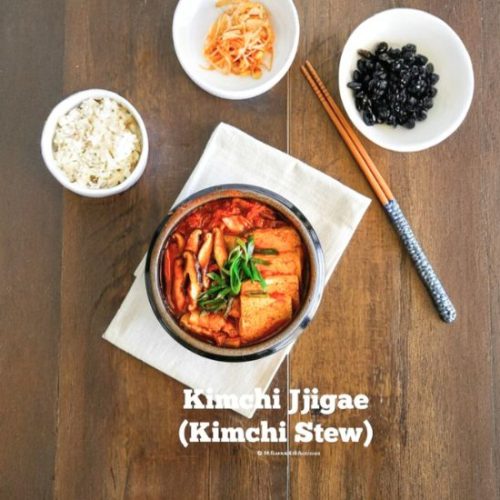
Korean Spicy Kimchi Stew (Kimchi Jjigae)
Kimchi Jjigae is an authentic Korean stew packed with bold, spicy, and tangy flavors from aged kimchi, tender pork belly, tofu, and mushrooms. Quick to prepare, this hearty stew is a perfect comfort food rich in protein and nutrients, ideal for warming up any day.
Equipment
- 1 clay pot (or 1.5-liter capacity pot/Dutch oven)
- 1 skillet or sauté pan
- 1 Sharp Chef’s Knife
- Measuring Spoons (set)
- Measuring cups (set)
Ingredients
Protein & Meat
- 180 g about 0.4 lb skinless pork belly, cut into bite-sized chunks
- 1 tablespoon sweet rice wine mirin
- A pinch of freshly ground black pepper
Kimchi & Vegetables
- ¾ cup well-fermented kimchi aged 2–3 weeks, chopped if needed
- ¼ small brown onion about 30 g, thinly sliced
- ½ small green onion stalk about 5 g, finely sliced
- 2 fresh shiitake mushrooms around 50 g, stems discarded and sliced thin
- 150 g firm tofu about 5.3 oz, cut into 1 cm thick pieces or preferred shapes
Broth & Seasoning
- 1 cup water 250 ml
- 1 tablespoon Korean chili powder gochugaru
- 1 tablespoon soy sauce
- 1 teaspoon Korean chili paste gochujang
- ¼ teaspoon minced garlic
- A few cracks of black pepper
Instructions
- Marinate the Pork Belly: Begin by combining the pork belly pieces with the sweet rice wine and a pinch of ground black pepper. Toss well to coat evenly and let it rest for 15 minutes to develop flavor and tenderness.
- Soften the Kimchi: In a skillet over medium heat, gently cook the chopped kimchi until it becomes soft and aromatic, about 3-5 minutes. This step enhances its flavor and mellows the acidity. (Alternatively, you can do this directly in the stew pot if it’s roomy enough.)
- Assemble Ingredients in Pot: In a medium-sized pot (such as a clay pot or heavy-bottomed Dutch oven), place the marinated pork belly at the bottom. Add the softened kimchi on top, then layer the sliced brown onion, shiitake mushrooms, tofu, and pour in the water.
- Mix and Add Seasonings: In a small bowl, whisk together the gochugaru, soy sauce, gochujang, minced garlic, and black pepper. Pour this seasoning mixture into the pot and gently stir to combine all ingredients evenly without breaking up the tofu.
- Simmer to Perfection: Place the pot over medium-high heat and bring the stew to a boil. Once boiling, reduce the heat to medium-low and let it simmer gently for 10 to 15 minutes. Occasionally spoon the broth over the ingredients to help the flavors meld evenly and ensure the pork is cooked through.
- Finish with Green Onion: Just before serving, stir in the sliced green onion for a fresh pop of flavor and color. Give the stew one last gentle stir, then remove from heat.
- Serve Hot: Ladle the kimchi jjigae into bowls and serve immediately, ideally alongside steamed rice and traditional Korean side dishes for a complete meal.
Notes
- Kimchi Choice: The depth of flavor depends on using well-aged kimchi—aim for kimchi that’s been fermented for at least 2-3 weeks for a robust, tangy stew.
- Tofu Texture: Firm tofu works best here to hold shape during cooking, but feel free to use medium firmness if preferred.
- Pot Options: A clay pot gives authentic results, but any medium-sized heavy pot or Dutch oven works well. Make sure it’s large enough to stir comfortably.
- Spice Level: Adjust the gochugaru and gochujang amounts to your preferred spice level—start with less if you prefer milder heat.
- Storage: Refrigerate leftovers in an airtight container for up to 3 days. Reheat gently on the stove to prevent tofu from breaking apart.